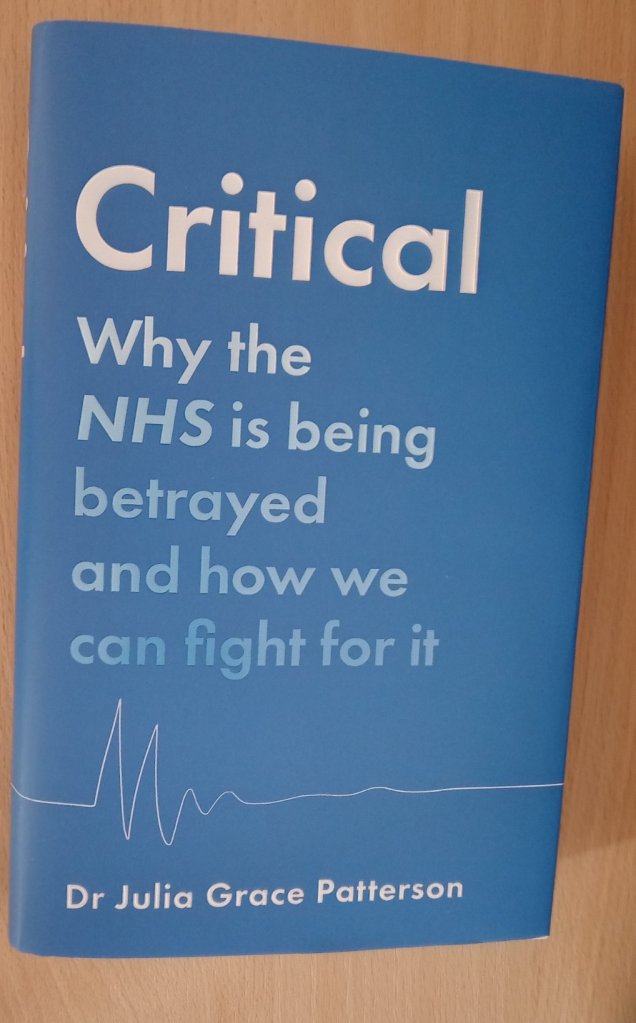Dr Julia Grace Patterson “Critical: Why the NHS is Being Betrayed and How We Can Fight For It”

I start writing this review on July 5 2023, the anniversary of the founding of our National Health Service, 75 years ago, back in 1948. I finished reading Dr Julia Grace Patterson’s Critical three days ago. The sub-title is a bit wordy, but does sum up the basic themes of the book. After several years working as a junior doctor, in our NHS, Julia moved on to become Chief Executive of Every Doctor, a group that campaigns on patient safety, plus staff pay and conditions. Opposition to the privatisation of our NHS is increasingly a focus for Every Doctor, an organisation founded by doctors, but now developing into a wider alliance of NHS staff and patients.
Dr Patterson provides a powerful diagnosis of the main problems being experienced by the NHS, these are underfunding by government – so resources fail to keep up with the growth of our population – fragmentation of the system, and privatisation. Early in the book, Julia tells us that there has been creeping privatisation, of large elements of our NHS, across the last 40 years. Anyone with a sense of political time will recognise the point being made, but I thought Julia was being too coy, until she makes it clear, about a quarter of the way through the book, that the attack on our public service health system was begun by Margaret Thatcher, and a Conservative government, back in the 1980s. We are now thirteen years into the misrule by another Conservative regime, one which has been ramping up privatisation.
In between two spells of Tory trouble, a Labour government massively increased funding of the NHS, but unfortunately enabled some privatisation, and the accumulation of massive debts for NHS Trusts, with the Private Finance Initiative programme. The author does not specifically make the point, but the New Labour approach, spearheaded by Tony Blair, undermined the founding principles of the public sector NHS, set up by Aneurin Bevan, the controversial and charismatic Minister for Health in the Labour government, elected in 1945.
I think that the author could have given more detail on the relentless growth of privatisation across recent decades. There is a lot of good material here in respect of recent years, along with a critique of the massive corruption of Tory government ministers giving Covid-related contracts to friends of Tory MPs. The latter is an issue which Every Doctor and the Good Law Project took to the courts, gaining a judgement that the government had acted unlawfully. Dr Patterson also clearly explains the way in which private health companies fund, and influence, MPs. This began as a Tory preserve, but unfortunately an increasing number of Labour MPs are also taking this suspect money.
Julia writes eloquently, with anecdotes from her growing network of NHS staff, about the massive scale of the crisis facing the service, and the daily pressures on front line staff. Patients are increasingly suffering, as the 40 “new” (mostly refurbished) NHS hospitals, and 50,000 new nurses, which the Tories have been promising since 2019, are imaginary, but over 7,000,000 people are on waiting lists – and this record number is increasing.
Much of the evidence provided by Julia is from the last few months. The author and publisher, Mudlark (an imprint of Harper Collins), should be congratulated on getting such an up-to-date book out, just before the NHS 75 celebrations. On the other hand, there are signs of some hurried writing, with a lot of repetition in both the points being made, and the actual phrases used in making them. Some factual inaccuracies have escaped the editorial, and proof reading, process. For example, the National Health Service Act was passed in 1946, an event Julia places in 1948, the year the plan was implemented (page 49). There is also a reference to Jeremy Hunt being Health Secretary from 2010 to 2017, whereas the correct dates are 2012 to 2018 (page 74).
As someone who has proudly worked as part of our NHS since 2013, in finance and administrative roles (I currently make decisions on patient funding), I am all too well aware of the crisis faced by the service. Despite the many problems set out by Dr Patterson, her ultimate message is a positive one, that NHS staff and patients (the latter group being the vast majority of people in Britain) are best placed to understand the crisis, and start to tackle it. Supposed political leadership is letting us down, but there are many great advocates, both NHS professionals and patients, for the rebuilding of our publicly-owned healthcare system, with treatment free at the point of use, and based on clinical need. Critical serves as a powerful manifesto for supporters of the NHS, and is therefore a book that deserves to be widely read, and debated.